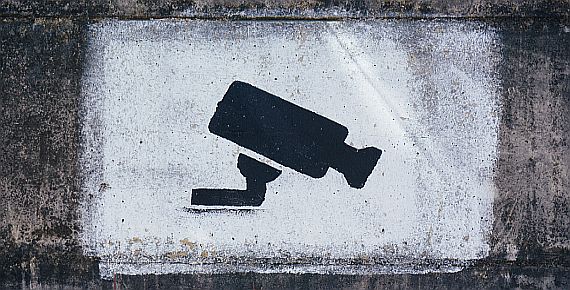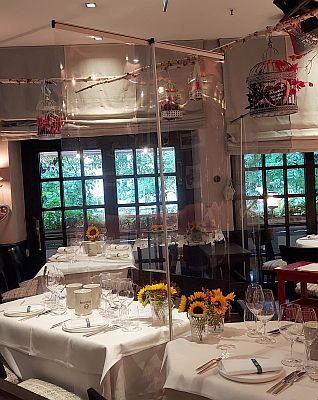Professor Stephan Gerhard on an intervening state, basic rights and inequities in the German hospitality sector
 |
| Democracy on the brink: Accomodation bans ruin the hospitality industry. / Photo: Unsplash Tobias Tullius |
Munich (November 6, 2020). With the second lockdown, which takes place now, in the month of November, the German hospitality industry has lost its balance: from now on it is all about insolvencies, livelihoods and the social consequences. In the background, lawsuits against the state and its regulations are piling up. Inspired by a discussion in a political circle, Prof. Dr Stephan Gerhard and Maria Puetz-Willems decided to do this interview, which shows how the constitutional state of Germany is turning into an intervening state when it comes to hospitality. And there is even a lot more at stake: the balance of the fundamental rights! Currently, the basic right to physical integrity supersedes everything. It is even forestalling the economy. But only healthy companies can guarantee a healthy economy.
In the German hospitality industry, the current second lockdown is practically an occupational ban for the industry. The industry is unjustifiably in the political pillory. The industry does not have any nameable advocates in politics. Demonstrations have almost no effect in Berlin and the associations simply ask for subsidies.
"We need a new discussion in the country," says a concerned Professor, Dr Stephan Gerhard. "Looking at the current social and economic development from a helicopter view, this finally leads to a sick social system and social unrest. The hospitality industry is a mirror of the society and thus reacts as sensitively as a seismograph. The one-sided state decrees concerning this industry therefore reflect an alarming development."
Stephan Gerhard entered the industry as an advisor 40 years ago and founded Treugast Consulting. Over the years, he became an investor and was co-founder of hotel companies such as 25hours Hotels, arcona Hotels & Resorts, Dormotel and Fidelity. Today, he is Managing Director of Solutions Holding, which holds shares in hotels, in catering and consulting companies and in the security sector. In addition, he works as a lecturer for Hospitality Development at Fachhochschule des Mittelstandes (FHM) in Schwerin and Berlin as well as assistant lecturer at several universities at home and abroad.
Professor Gerhard, you have experienced many crises. Lockdowns are not among them. Since March, the hotel industry has been in the political pillory: subsidies help only the smallest businesses while medium-sized companies that define the structure – middle-class companies – with hundreds or even thousands of employees have not seen much of three bridging aids. They also do not expect to benefit from the most recent bonus of receiving 75% of the turnover achieved in November last year. Why not?
 |
|
| Professor Stephan Gerhard: We are dying while trying. / Photo: Arnulf Hettrich |
Basically, this a good idea of the government. It provides 10 billion euros, half of which is needed by the hospitality sector, according to experts. The losses across the industry in this sector accumulated since the first lockdown in March is bigger than that of all other industries together.
The fresh billions are directed to small and medium-sized companies. The small companies with up to 50 employees (and probably with more than 50 employees) will receive these aids according to my knowledge, but not the medium-sized entities as they usually have more than 50 employees. This category has not benefitted from any kind of aid as yet, not even from the three bridging aids so far. The reason: hotel groups with 20, 40, 60 or even more hotels are considered a single business. They fall through the grid. The big companies, however, have already benefitted from aids and KfW loans.
I hear from the market that banks have already started terminating credit lines to meet their own standards. Terminating a construction loan or other kinds of financing is tantamount to a heart attack for many entrepreneurs and companies.
What is your conclusion in a single sentence?
The money is there, but the industry cannot reach it. We are dying while trying.
Objectively, impractical and complicated guidelines are preventing the payments. The three bridging aids of the past months are still being reviewed today. Many of them have still not been paid out. In my opinion, this is mainly due to bureaucracy and the adherence to rules that are simply not appropriate during a crisis. Politicians have to realize that unfortunately, we are not operating in normal mode at the moment.
Is something out of balance?
Absolutely. In the past few days, I have seen and sensed massively rising unrest. The industry feels it is being treated unfairly. I just picked up a sandwich in the neighbourhood around the office. Two businesses out of ten were closed – both of them catering outlets. A pharmacy, a hairdresser, a retailer, a bits and bobs store and more were open. Why are the catering businesses closed?
They are not places where the virus is spreading, which has been certified even by well-known virologists. On the contrary, they have consistently implemented hygiene concepts! The black sheep can easily be identified. The authorities know where the premises are.
Objectively, the second lockdown, which is not different from the first one apart from the open schools and kindergartens, is in fact a professional ban for the industry. And that is a disproportionate restriction of our fundamental rights! In addition, I see a clear danger of social isolation due to the current restrictions, which would be different, if the social infrastructures of hotels, restaurants and similar commercial businesses were kept open.
Government puts the basic right of physical integrity above everything else…
Nobody from the hotel and catering industry questions health protection. Especially not this sector, for which care has been a part of everyday life for decades. The sector serves fresh food for millions of people every day, deals with guest allergies and much more. It has been inspected by trade authorities for many years/decades to ensure that hygiene standards are maintained. Moreover, sustainability has long established itself and is being practiced in hotels across the world. The industry has implemented the additional corona hygiene requirements without any complaint and at its own expense. Employees serve the guests eight hours a day wearing qualified face masks.
Why doesn't work on assembly lines stop in the automotive industry? Who controls the social distancing in authorities or inside the parliament? Nobody talks about aerosol densities there.
Nonetheless, the lockdown singles out the hospitality industry once more. This puts priorities out of balance. The question is: Which weighs more – health protection or economic protection? And don't we need to bring this back into a better balance? We indeed feel strongly one-sidedly disadvantaged.
 |
|
| Do we have to choose between health and existence now? / Photo: unsplash Irelandfleur |
The accommodation ban, which has now been issued once more in most German states thanks to Justitia affects only tourists, but not business travellers. How perfidious is that?
This can hardly be put into polite words. The hotel is the safest place during a business trip: booked contact-free (online), it is often possible to open the room door via smartphone. The room itself is sealed, fully disinfected with walls that keep viruses out. You can either have your food brought into the room or have the bun bag hung outside on the door handle.
It is not comprehensible at all, why a stay in a resort hotel room should be more dangerous than in a business room. This image alone does not represent an appropriate balance, and certainly not a balance between the rights involved.
Yesterday, the government frightened many people with something new: in the soon-to-be newly adjusted, third Infection Protection Act, not only will tourist travel be prohibited, but all kinds of travel can be restricted. The initial reading on this issue is even taking place today, November 6, in the Bundestag. This was revealed by the Spiegel magazine. What do you think about it?
In my view, it would be an unprecedented dimension in the one-sided discrediting of the industry – and would once again massively limit the fundamental right of free practice of a profession. Politicians apparently want to avoid being forced by the courts to take back the ban on accommodation once more, which had been installed by the individual states at short notice and arbitrarily in October. Now, politicians are taking precautions. The industry must defend itself here and such plans must also be discussed loudly in public!
In the justification for this plan, the government openly expresses what it wants according to Spiegel – at the expense of an entire industry: "A 'restriction of overnight accommodation offers' is [also] suitable to reduce mobility in the Federal Republic and thus contribute to ensuring the traceability of infection chains and to minimising social contacts and thus to slowing down the spread of the virus."
Although it also says that the associated burdens for travellers and for providers of overnight accommodation will be reduced by a time limit, it would again be a total lockdown for a single industry.
In practice, this also means, among other things that the industry will continue to lose reliability and this will deter more and more investors. Politics is freezing the industry, so to speak – alive and kicking.
Further measures pose a new challenge for hoteliers and restaurateurs. For months, they have been collecting the data of guests on a data sheet on behalf of the state, for example, but also checking whether funny names like "Donald Duck" have been entered … that is surely not their job!
Clearly not. An innkeeper is not allowed to ask for a guest's identity card, so he is not allowed to check it on behalf of the state either. Such measures cause massive damage to the industry – also because the background information is not correctly communicated to the public. Here, too, professional hoteliers and caterers have very quickly made use of digitisation and installed software and apps that can be quickly established to avoid lost time and effort and confusion. Numerous software companies have even made their tools available for free. We cannot prevent media from transporting other images. But it all contributes to the disproportionate assessment of the situation. Integrating digitised processes into operational tasks is no problem at all – if citizens go along with it.
 |
|
| Perfect hygiene and no infections: Nevertheless restaurants and hotels must close. / Photo: map |
What are politicians doing wrong here?
We must not slide into becoming a state that monitors everything, but we already are! Our country has responsible citizens, and they must remain responsible citizens. Only a police state acts the way the hospitality industry is currently experiencing. Before any money flows, applications and companies are checked. This is absolutely okay during normal times, because the time frame is different. In an absolute stress situation like the one we are in now, even during a lockdown, such lengthy Prussian checks are no longer appropriate. On the contrary, they suggest that the state does not trust us. The government even accuses us of deliberately making false statements.
The question that arises here is about the cost-benefit balance between closure and the long-term failure of large parts of our barely functioning economic system.
It is also strange that this feeling does not arise when it comes to distributing short-time work benefits. No trickery is assumed in this sector, registration and allocation are carried out without any problems, in good cooperation. Why can't the same be said of the other corona emergency programmes?
Entrepreneurs are reliable taxpayers and not bandits. They are the ones who carry the future of our community with these tax payments. What does the state do if this tax flow is permanently restricted or even dried up?
With false priorities set by the state, more and more companies from the industry are drifting towards insolvency. In addition, since last Monday, a wave of complaints has been building up from the hospitality sector. It is a matter of livelihoods and many jobs. How quickly will mass unemployment occur?
Probably faster than we expect. Dehoga reports that since the beginning of the corona crisis in March and up to the end of September 2020, a total of 128,503 notifications for short-time work have been received. Translated into the number of employees subject to social insurance contributions, this affects over 1.1 million people.
But the first companies have already had to close down for good and thus also lay off employees. If there are further restrictions, lockdowns and if the economy does not pick up very quickly, insolvencies will increase. This simply generates more unemployment, and we are talking about significant figures in our labour-intensive industry.
Often, these projections do not take into account (tens of) thousands of flat-rate workers (e.g. housewives as breakfast helpers) and students who finance their shared flat via the service job. If these people become unemployed, we will have a significantly large group that will not be able to obtain jobs in the long run. It is imperative to prevent this from happening, so that we can guarantee social peace in the long term.
The hotel industry plays an important role in this discussion: it employs staff across the entire social spectrum – from dishwashers to top managers, as well as the disabled and migrants. The industry is cosmopolitan and has been working for years with multinational teams in chain hotels and large resort hotels; in rural areas it provides people from the region reliably with jobs and wages. Until now.
All that sounds like pure political activism towards the industry, not like a concept!?
At the moment, I can only say that I'm only one of many busy and responsible entrepreneurs: The current policy simply does not help entrepreneurship in the industry sustainably and on a large scale. And yet there are few industries that play such a big and important role in society.
Hotels, restaurants, bars, cafés, discotheques, clubs, etc. are the decisive part in the communicational social puzzle, the soul of a good neighbourship. Those who take away people’s beer in the pub, the pizza around the corner, the nightcap at midnight, destroy a positive core of our society – with uncontrollable economic consequences and social poverty.
This no longer stands in any relation to health protection. We need a new discussion about a better balance of the fundamental rights affected in our society. And quickly, very quickly. The society urgently needs a healthy economy for the sake of the stability of the healthcare system and for social stability.
Thank you very much for the interview!
Interview: Maria Pütz-Willems


